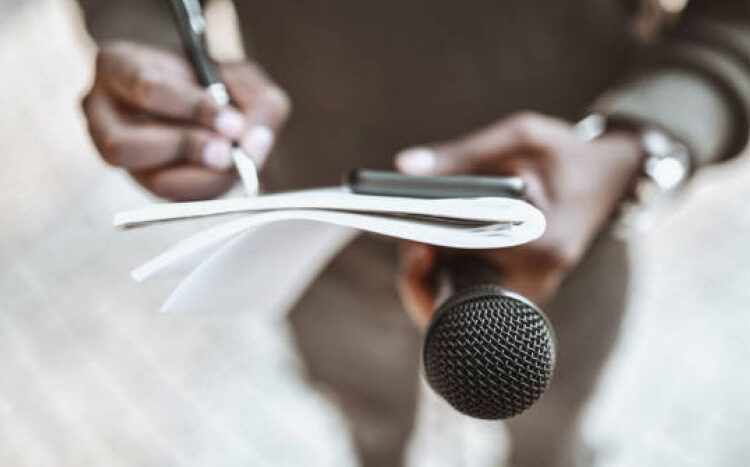In the past week, a young journalist with RFI Hausa, Hauwa Halliru Gwangwazo, faced a wave of online harassment that once again exposed a deep-rooted illness in our media and digital culture: the persistent tendency to judge professional women not by their competence, insight, or contributions, but by the curve of their faces or the accident of their beauty.
What began as a handful of posts admiring her on-screen appearance quickly spiralled into a torrent of objectifying, sexist, and vulgar remarks, many of them written in Hausa and spread across Facebook and other social platforms. The comments had nothing to do with her journalism. They had nothing to do with the depth of her reporting or her mastery of the craft. Instead, they reduced her professional identity to her physical appearance. Her image was commodified; her dignity undermined. And in the process, the space for serious female voices in northern Nigerian journalism was constricted once more by the choking grip of digital misogyny.
Hauwa’s only “offence” was doing her job well and appearing confident while doing it. For that, Facebook and other social media platforms became spaces of obsession, objectification, and sexualised commentary—most of it stripping away her humanity to elevate spectacle over substance. What some dismiss as “innocent fun” is, in fact, systemic digital harassment and the devaluation of women in journalism. Hauwa’s experience is a symptom of a society still unsure how to respect female excellence unless it comes wrapped in anonymity.
What happened to Hauwa is not new. It reflects what countless women in the media industry face every day, especially in regions where patriarchy, religious conservatism, and socio-cultural expectations intersect to produce a unique form of gendered surveillance. As former broadcast journalist Rahama Dokaji wrote in a widely shared reflection, many capable women leave radio or television not because they lack resilience or ambition, but because the environment relentlessly erodes their professional confidence.
“We’re expected to be grateful,” she wrote, “when people notice us—not for our professionalism or skills, but for our physical appearance.”
This corrosive pattern drives many talented female journalists off air, especially in northern Nigeria, into the relative invisibility of print—where their worth is judged on ideas, not appearances.
What message are we sending to young girls who dream of holding microphones in public spaces? What incentive do we give the next generation of female broadcasters when all they receive in return are jokes, slurs, and sexualised memes?
More importantly, what kind of society do we become when the very voices meant to hold power to account are silenced by the tyranny of the male gaze?
In Nigeria, women journalists walk a tightrope. On one side lies the demand for visibility—being on air, being seen, being present. On the other side is the cost of that visibility—sexualised attention, unsolicited commentary, threats to personal safety, and even pressure from within their own newsrooms to conform to gendered expectations. In northern Nigeria, the problem is compounded by deeper conservative norms that often see a woman’s voice in the public space as inherently suspicious—or worse, immoral. Women who persist in this line of work do so with a double burden: the pressure to prove their professional competence, and the constant need to defend their dignity.
In the considered opinion of this newspaper,the objectification of female journalists like Hauwa is not just offensive—it is dangerous. It discourages young girls from pursuing careers in media. It fuels the idea that women in public-facing roles are fair game for ridicule or romantic fantasy. And it weakens the credibility of journalism itself by shifting the focus from content to cosmetics. When women retreat from radio and television because of harassment, we lose vital perspectives. When they self-censor to avoid attention, we lose courage in storytelling. When they disappear from leadership in newsrooms, we lose balance in agenda-setting.
This newspaper believes in the dignity of all workers, and in the right of journalists—female or male—to do their jobs without fear, ridicule, or harassment. Beauty may attract attention, but it must never eclipse professionalism. And it must never become a gateway to digital violence. Leadership begins with restraint—not only in government, but on the keypad, on timelines, and in public commentary.
We call on media houses to do more to protect their female journalists. We urge social media platforms to strengthen their tools for reporting gendered harassment, ensuring that women—not just journalists—are safe in their online engagements. And we call on society, especially men, to check their impulses. A woman in the newsroom is not there for decoration. She is there for impact.
Hauwa Gwangwazo should not have to choose between being visible and being safe. Nor should any other woman in journalism.
This is the stance of this newspaper.And we will continue to use our voice to defend not only Hauwa, but every journalist in Nigeria—and beyond.





